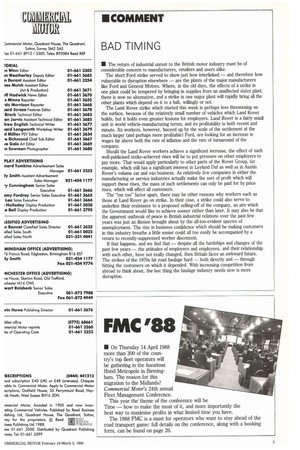BAD TIMING
Page 5

If you've noticed an error in this article please click here to report it so we can fix it.
• The return of industrial unrest to the British motor industry must be of considerable concern to manufacturers, retailers and users alike.
The short Ford strike served to show just how interlinked — and therefore how vulnerable to disruption elsewhere — are the plants of the major manufacturers like Ford and General Motors. Where, in the old days, the effects of a strike in one plant could be tempered by bringing in supplies from an unaffected sister plant, there is now no alternative, and a strike in one major plant will rapidly bring all the other plants which depend on it to a halt, willingly or not.
The Land Rover strike which started this week is perhaps less threatening on the surface, because of the relatively small number of vehicles which Land Rover builds, but it holds even greater lessons for employers. Land Rover is a fairly small unit in world vehicle-manufacturing terms, and its profitability is both recent and minute. Its workers, however, buoyed up by the scale of the settlement at the much larger (and perhaps more profitable) Ford, are looking for an increase in wages far above both the rate of inflation and the rate of turnaround of the company.
Should the Land Rover workers achieve a significant increase, the effect of such well-publicised strike-achieved rises will be to put pressure on other employers to pay more. That would apply particularly to other parts of the Rover Group, for example, which still has a significant interest in Leyland Daf as well as in Austin Rover's volume car and van business. As relatively few companies in either the manufacturing or service industries actually make the sort of profit which will support these rises, the mass of such settlements can only be paid for by price rises, which will affect all customers.
The "me too" factor apart, there may be other reasons why workers such as those at Land Rover go on strike. In their case, a strike could also serve to underline their resistance to a proposed selling-off of the company, an aim which the Government would like to achieve sooner rather than later. It may also be that the apparent outbreak of peace in British industrial relations over the past few years was just an illusion brought about by the all-too-evident spectre of unemployment. The rise in business confidence which should be making customers in this industry breathe a little easier could all too easily be accompanied by a return to recently-suppressed worker discontent.
If that happens, and we find that — despite all the hardships and changes of the past few years — the attitudes of employers and employees, and their relationship with each other, have not really changed, then Britain faces an awkward future. The strikes of the 1970s hit road haulage hard — both directly and — through hitting the customers on which it depended. With increasing competition from abroad to think about, thelast thing the haulage industry needs now is more disruption.
































































































































